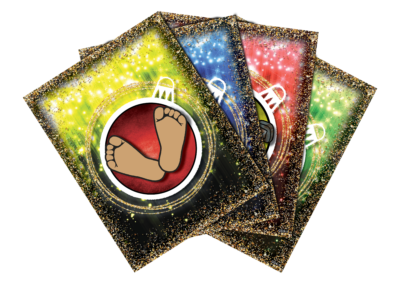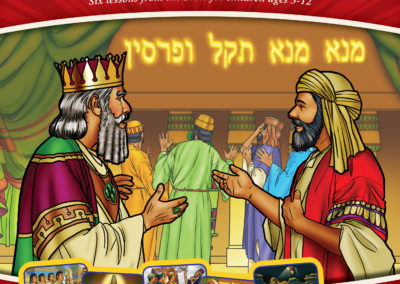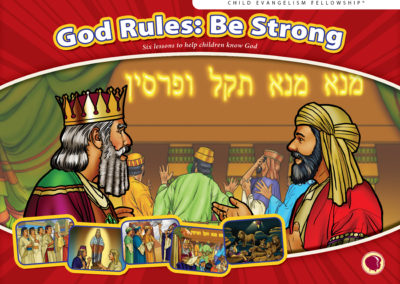Teaching the Divisions of the Bible: Major Prophets | Sunday School Solutions
by Aubrey Kyle
In the Old Testament, we read of several different prophets and how God used them to deliver His messages to people. Often, these messages were difficult to understand, especially when they were sad or when they addressed things that hadn’t happened yet. These messages and books can be confusing for adults, let alone children. Keep reading to see how you can teach clearly about the prophets to the children in your Sunday school class!
So far, in this series, we’ve covered the Pentateuch, History, and Poetry sections of the Bible. The last two sections of the Old Testament are called the Prophets, and we divide them into the Major and Minor Prophets. Today, we’re going to talk about the five books that make up the Major Prophets section of the Bible—Isaiah, Jeremiah, Ezekiel, and Daniel. Each one wrote his own book, with Jeremiah also writing Lamentations.
These prophets had challenging messages for God’s people. The main job of the prophets was to deliver God’s messages to others, and people didn’t always like those messages. Isaiah told the Jews that they needed to turn back to God, but even so, they would face judgment for their sin. However, he also told them they could be encouraged by the fact that God loved them and would send them a Savior.
For a children’s lesson that includes some of these exciting prophecies, especially the prophecies about Jesus, check out Joy to the World on CEF Press®.
Jeremiah had to preach that God’s people had grieved Him and would be judged and that they needed to surrender to their enemies. Lamentations, which means “crying or expressing grief,” describes the lamenting, or crying, Jeremiah does because of that judgment. If you have read the book of Jeremiah or Lamentations, it is easy to see why Jeremiah is often referred to as “the weeping prophet.” Even through sorrow and judgment, however, God’s forgiveness and love can also be seen within these books.
Even through sorrow and judgment, however, God’s forgiveness and love can also be seen within these books.
Ezekiel, another Major Prophet, was a prisoner of war with the Jews who had been taken captive in Babylon. He told them their situation was God’s punishment for Israel’s sins, but if they turned back to God, He would bless them individually and bless and honor Israel as a nation in the future.
Even with these somber messages, each of these prophets teaches about God’s love and faithfulness. Make sure to show this to the children you teach. Isaiah says the Jews could be encouraged by the fact that God loved them and would send a Savior. Jeremiah and Lamentations teach that we must take sin seriously, but that even when facing judgment or consequences for sin, God offers forgiveness. Ezekiel told the captive Jews that if they turned back to God, He would bless them individually, while also reminding them that God would bless and honor Israel in the future.
Even with these somber messages, each of these prophets teaches about God’s love and faithfulness. Make sure to show this to the children you teach.
As you teach kids in your children’s church about the different prophets, you could have someone dress up like a prophet. Being able to “see and hear” the different prophets will help bring both them and the messages they delivered alive to the kids in your children’s church.
The final major prophet, Daniel, is a little more familiar because of the exciting stories of his life. Through these stories, teach the children in your Sunday school class to remember that even when bad things happen, God cares for them and wants them to live for Him. We can also see the importance of standing up for what’s right, even when others want us to do wrong through the lives of Daniel and his friends. Teach the children in your Sunday school class to remember that, even when bad things happen, God cares for them and wants them to live for Him.
For lessons you can use to teach the kids in your children’s church about Daniel, his friends, and how these stories relate to them, visit CEF Press®.
When teaching about any of these Major Prophets, have the children in your Sunday school class repeat the five books of the Major Prophets with you so they can learn their order. Use the fun game below to learn those five books while reviewing the previously learned ones as well!
“Pizza Pan Placement”
Write each book of the Law, History, and Poetry divisions on a clothespin, so you end up with 27 clothespins total. “Pin” the clothespins in order around the edge of a large cardboard circle the size of a large pizza pan. After these pins are placed, use painters’ tape or a marker and make “pizza slices” for each of these divisions. Make sure that all the clothespins for each division will fit in their correct “pizza slice.” You may need to make some slices bigger or smaller as necessary. Write the name of each division in the correct “pizza slice” (you can even decorate the circle to look like a pizza if the division names can still be read), and remove the clothespins from the cardboard circle. Have the children take turns placing the clothespins in their correct “pizza slices” until the entire pizza is filled!
Many of these Major Prophets had both difficult lives and unwelcome messages, and there is so much you could tell the children about them. Through these books, we read of the prophets’ lives, what was happening with God’s people at different times in history, and prophecies that either have been or will be fulfilled. This section of the Bible teaches valuable truths.
If there’s a major, there must be a minor! Join us next time as we take a look at the Minor Prophets.


